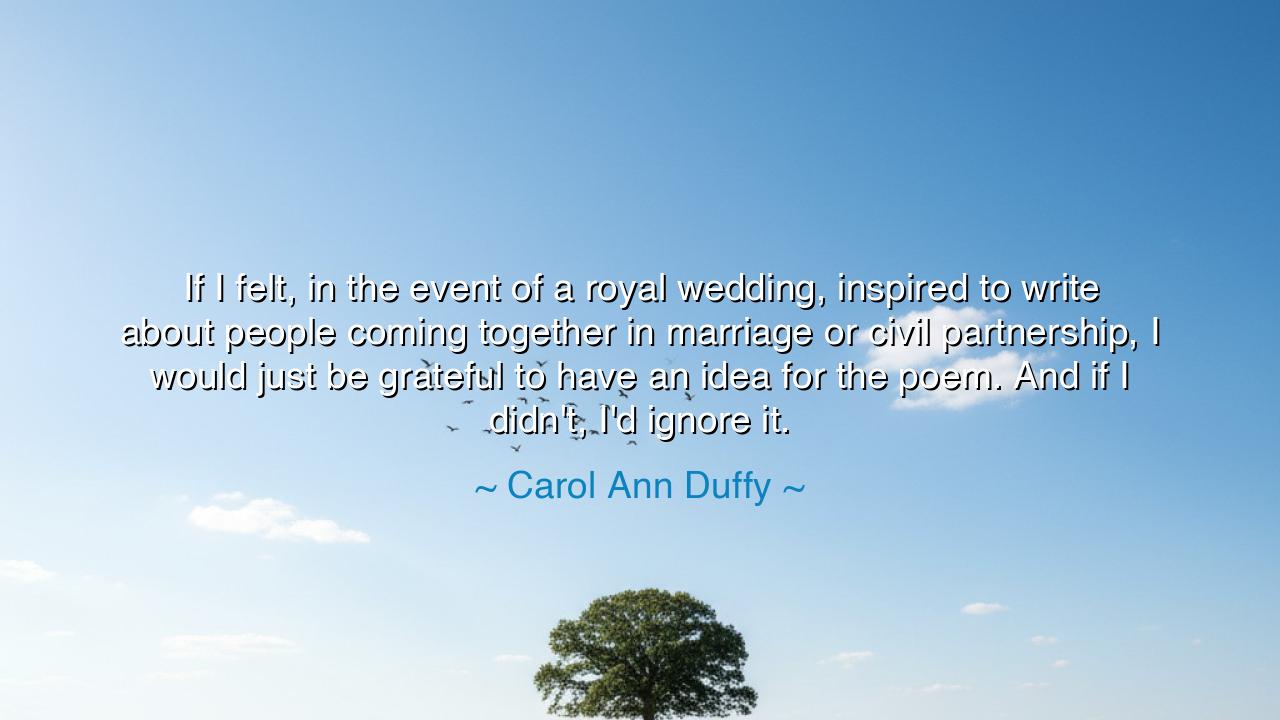
If I felt, in the event of a royal wedding, inspired to write
If I felt, in the event of a royal wedding, inspired to write about people coming together in marriage or civil partnership, I would just be grateful to have an idea for the poem. And if I didn't, I'd ignore it.






In the vast expanse of human experience, where the words of poets and the deeds of kings are woven together through time, we come upon the profound simplicity of Carol Ann Duffy's words: "If I felt, in the event of a royal wedding, inspired to write about people coming together in marriage or civil partnership, I would just be grateful to have an idea for the poem. And if I didn't, I'd ignore it." These words speak not only to the creativity of the poet but to the essence of what it means to create—to respond to the world not with obligation, but with deep, authentic inspiration. In them, we find a lesson about the nature of art, about the humility of the artist, and about the freedom to choose when and how to engage with the world.
In ancient times, the poets were seen not as mere craftsmen of words, but as the voices of the divine. They were the ones who could capture the essence of the human condition, who could find the meaning in the grand events of the world—whether that be the birth of a king, the tragic fall of a hero, or the sacred union of two souls. Yet even in these ancient works, we see that the poets wrote not because they were bound to do so, but because the inspiration came upon them like a flood—a force that they could neither deny nor control. Homer, the blind poet, did not write the Iliad and Odyssey because he was commanded, but because the gods themselves whispered their stories to him. So too, Duffy reminds us, the poet is free to write when moved, and to remain silent when not.
Consider, for example, the timeless story of Sappho, the ancient Greek poet whose works spoke not only of love, but of the heartache, the joy, and the passion that come with human connection. Sappho’s poetry was driven by the inspiration of the moment, by her own experiences of love and loss, and by the profound connection she felt to the people and world around her. She did not write because she was told to; she wrote because the muse compelled her, because the words poured forth like the tide itself. Similarly, Duffy's reflection on the nature of her own craft reminds us that the poet’s duty is not to follow external expectations, but to be true to the internal spark that ignites creativity.
In the context of a royal wedding, such a grand and public occasion, there might indeed be pressure on a poet to engage, to write, to speak to the world about the celebration of marriage. Yet, Duffy reflects on this with a certain humility—if the inspiration is not there, then the poet is under no obligation to force it. There is wisdom in this recognition: inspiration cannot be commanded, it must be nurtured. To write a poem simply because it is expected would be to dilute the sacred nature of the craft. Duffy acknowledges that if the heart does not feel moved by the event, then it is better to remain silent than to force the act of writing. In this, she upholds the integrity of her art and the deep respect for the creative process.
Consider the example of William Shakespeare, whose works on love, marriage, and human relations are immortalized in plays like Romeo and Juliet and A Midsummer Night's Dream. Shakespeare wrote not because society demanded it, but because he saw the world with unclouded eyes, capturing the complexity of love and human nature in ways that still resonate today. But even Shakespeare was not immune to the ebb and flow of inspiration. It is said that he often took years between plays, waiting for the right ideas, the right moment. Like Duffy, Shakespeare understood that creativity is a force that must be allowed to flow naturally, rather than be constrained by the expectations of the outside world.
From Duffy’s words, we can draw a profound lesson: the act of creation is sacred, and the artist is not a mere instrument to fulfill the needs or expectations of others. Whether writing poetry, painting a masterpiece, or composing music, the artist’s true power lies in their ability to remain true to the inspiration that arises within them. To force creativity, to write simply because of an external event, is to risk losing the authenticity of the work. And so, in all things, the artist must remain patient, waiting for the right moment when the ideas come, when the heart stirs, and when the world calls for the artist to speak.
Thus, let us take Duffy’s reflection into our own lives. Just as the poet does not write because they are told to, so too must we create from a place of deep, authentic desire, not out of obligation or external pressure. Whether we are artists, workers, parents, or dreamers, we must seek to engage with our work and our lives when we are truly moved, when we are inspired. It is in these moments, when we act from the depths of our soul, that we find the greatest fulfillment, the greatest joy. Let us create not because the world demands it, but because we are called to it from within. And when the muse of inspiration does not visit, let us have the wisdom to remain silent, knowing that the pause is just as important as the creation.






AAdministratorAdministrator
Welcome, honored guests. Please leave a comment, we will respond soon